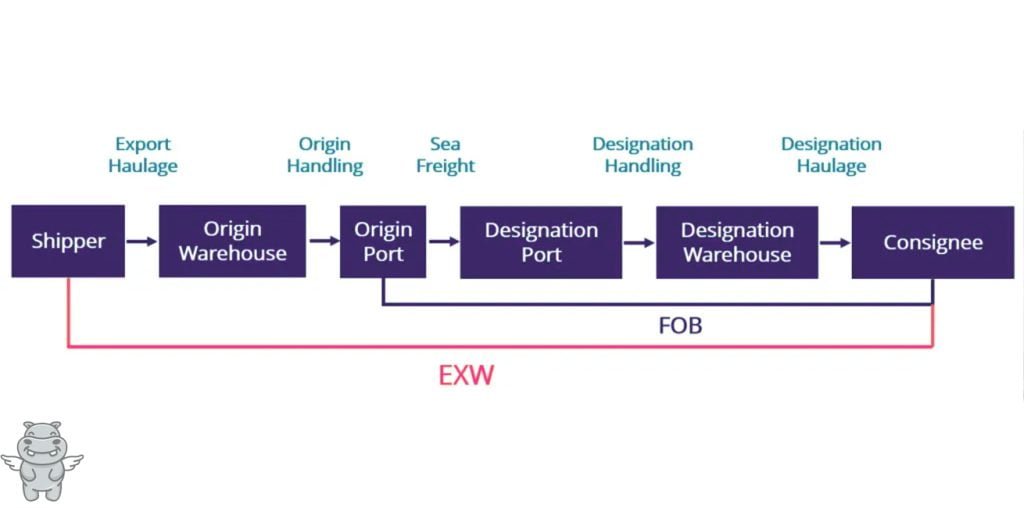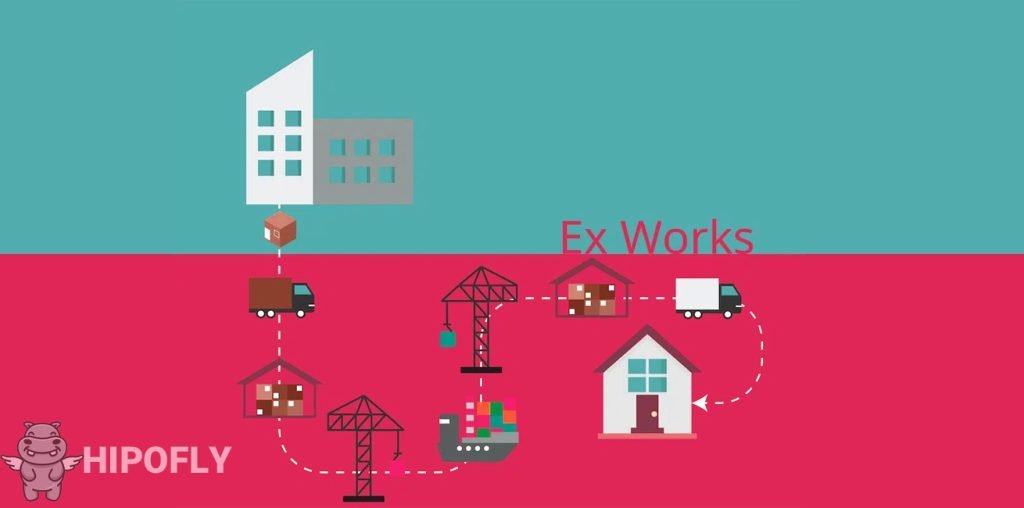What does Ex Works (EXW) Incoterms mean?
When Ex Works terms are used, the buyer is responsible for the whole shipment, from door to door. The buyer is responsible for all costs and risks.
An EXWorks Incoterm is a contract that puts the most risk and responsibility on the buyer by requiring the seller to only make the goods available to the buyer at their warehouse or dock. Once the buyer takes possession of the cargo, he or she is responsible for everything else, including getting it to the port of destination.
quote is-style-default has-black-color has-luminous-vivid-amber-background-color has-text-color has-background is-layout-flow wp-block-quote-is-layout-flow" style="font-style:normal;font-weight:400">The buyer, on the other hand, is responsible for loading the goods onto the pickup vehicle, transporting them to the port of origin, paying and making arrangements for export, main carriage, paying and making arrangements for import, and all transportation in the country of destination.
HipoFly Tips!
Ex Works, which is sometimes written as EXW or ExWorks, is an international shipping term or Incoterm that is used a lot. The terms tell the Shipper, who is usually the seller, and the Consignee, who is usually the buyer, who is in charge of what when the goods are shipped from one place to another.
Under Ex Works shipping terms, the only thing a seller has to do during the whole shipping process is make sure that the goods they are selling are ready to be picked up at their place of business.
What are the advantages of Ex Works (EXW)?
One benefit of ex works (EXW) for buyers is that a consignment of goods (a group of items ready to ship) is often a little cheaper than goods bought under other terms. Under EXW, the seller won’t include the cost of getting the item to a port or the cost of customs fees. EXW could save the buyer money on shipping costs if they can hire a cheaper logistics company to handle the shipping or if they know how to handle customs duties on their own.
On the other hand, EXW is good for sellers because they don’t have to do much and don’t have to take any risks that come with logistics.
In some cases, EXW is the best way to ship goods. For example, companies that usually buy from one country can use EXW if they want to combine products from different suppliers and ship them all at once. In this case, EXW is best because it lets the buyer export all of the goods at once.
Buyers can also hide who their suppliers are if they want to. They can ship using an incoterm called “EXW” and put a different name for the exporter on the shipping documents.
When looking at how much it costs to buy something, EXW is often the least expensive option. In some cases, sellers can get a tax refund on the goods they export. If a seller depends on this refund for all of their profit, then FOB may be cheaper for both the buyer and the seller. But most of the time, EXW will be the cheapest option because the seller doesn’t have to do much more work.
EXW could be a good choice for a business that often buys from a certain country and has a license to export. We like to point out that EXW can come with a lot of risks, so we usually suggest that a buyer let a trusted company handle everything for them.
A good example of why a buyer would want to use EXW is that some countries, like China, have cheap and high-quality manufacturing options that are based in the country. When a seller can’t export, ex-works lets an international buyer buy on the domestic market and use their exporting methods.
There are a lot of companies that only care about making great products for the local market and never bother to get export licenses or sell their products to the rest of the world. If you are a smart enough sourcer, you can find some of these factories and take advantage of their local prices by signing purchase contracts under “ex-works terms.”
What are the disadvantages and risks of using Ex Works (EXW) terms?
Under EXW terms, buyers have to pay for and take full responsibility for all risks and costs of shipping. Under EXW agreements, it is up to the buyer to hire a transport company, handle export clearance, get insurance, and do other things.
If your supplier will only sell their goods under the EXW incoterms, your best bet is to find a third-party logistics company or freight forwarder who can help you with the export. For example, if you want to export from China, we can help by naming an entity to act as the exporter on your behalf. In some cases, our company can act as an exporter and take care of the export.
What’s important is that you talk to your forwarding agent and ask them if they have the right export licenses to act as the exporter.
Who pays for freight when use Ex Works (EXW)?
Once buyers get their goods, they are responsible for other risks, such as loading the goods onto trucks, moving them to a ship or plane, and following customs rules.
Ex Works (EXW) Incoterm responsibilities
In an EXW agreement, both the buyer and the seller have responsibilities.
Seller’s responsibilities
Under the EXW Incoterms, the seller doesn’t have to do very much. Basically, all they have to do is make sure the cargo is ready to be shipped and that the goods can be picked up from their location. Most of the time, this means that the goods are already in export cartons. Once the cargo is ready, the seller must put it in a place where the buyer can pick it up.
Buyer’s responsibilities
Once the buyer gets the goods from the seller, he or she is responsible for everything. The following are some of these responsibilities:
Costs for loading
Loading the cargo at the pickup site so that the goods can be taken to the port and shipped overseas.
Transporting to a port or place
Getting the goods to the port of origin is the first step in the process of exporting.
Export Duty, Taxes, and Clearing Customs
All paperwork needed to export the cargo, as well as any fees that need to be paid. The buyer has to figure out how to export on their own.
Original Terminal Fees
At the terminal, all fees must be paid by the buyer.
Loading on the Carriage
the obligation related to loading the cargo onto the carriage.
Transportation Costs
All costs related to transporting the cargo from one port to another.
Insurance
Even though it’s not required, the freight can be insured to protect against damage, theft, or loss.
Fees for Destination Terminals
All fees that are charged by the port and terminal at the destination. When the shipment gets to its final port, the terminal charges fees to unload it from the ship and move it around the harbor.
Delivery at Destination
The costs associated with transporting the cargo from the destination port to the final destination.
Unloading at Destination
Once the goods have arrived at their destination, the costs of unloading the cargo from the last carrier.
Import Duty, Taxes & Customs Clearance
All duties and taxes that go along with bringing the cargo into the country where it will be used.

FOB or Ex Works, Which one is better for you?
Goods that are shipped EXW are usually cheaper than those that are shipped FOB. This is because Free on Board means that the supplier pays for shipping, handling, and clearing customs.
EXW terms, on the other hand, are often riskier because the supplier is in charge of the goods until they get to their destination.
Does Ex Works (EXW) include packaging?
Under “ex-works” terms, it is the seller’s job to make sure the items are packed safely and securely. It is not up to the buyer to package items for shipping. Still, it’s important to remember that sellers can add the cost of packaging to the total fee for a transaction. Even though it’s not the buyer’s job to package an item, he or she may indirectly pay for it to be done.
Are EXW Agreements for China Imports Make Sense?
When importing from China using Air Express, EXW is a good choice.
When a buyer goes to China to buy goods directly from markets like Yiwu Market, most sellers quote their products as EXW and expect the buyer to set up pickup and shipping.
Some buyers think that EXW is cheaper than FOB because the unit price is often lower with EXW.
But with EXW, the buyer still has to arrange all inland shipping and export documents.
When these extra costs are taken into account, the price difference is often small or more expensive than just shipping FOB.
So, the clear benefit of EXW is that the buyer can see and control the full cost of logistics. But keep in mind that you must know what you are doing.
HipoFly is the best at meeting all the requirements of EXW agreements on behalf of our clients because we are the top China Freight Forwarder.
Lastly, no matter which incoterm you use, make sure you also get China freight insurance. It’s a cheap way to reduce stress and protect your supply chain from huge losses.

Conclusion
We looked at Ex-works terms this time.
You can learn more about Ex-works if you look at it from the point of view of both an exporter and an importer and compare it to the status of your company
Ex-works is a term that gives exporters the least amount of responsibility.
If you’re thinking about exporting overseas, it might be a good idea to talk to your business partner at the company doing the exporting about using Ex-works terms.
If you want to bring down the cost of importing, you could also talk to HipoFly about using Ex-works terms.
FAQs
What’s the difference between “Ex Works” and “Free On Board”?
Does EXW Incoterms include customs duties and taxes?
What does EXW stand for?
Why does your Chinese supplier have to insist that you use their export declaration forms when you do EXW, and they have to fill out the form when you ship from China?
This is why many contracts are made on EXW terms, but goods are shipped on FOB terms.


